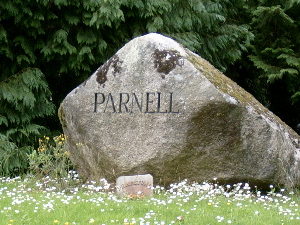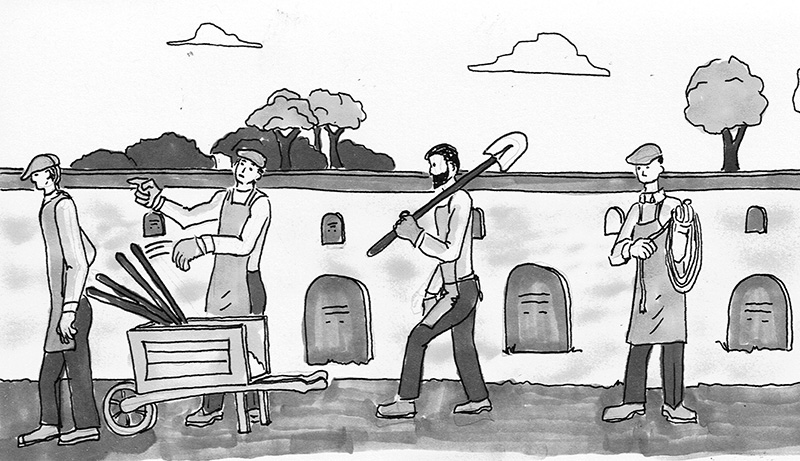—And tell us, Hynes said, do you know that fellow in the, fellow was over there in the…
He looked around.
—Macintosh. Yes, I saw him, Mr Bloom said. Where is he now?
—M’Intosh, Hynes said scribbling. I don’t know who he is. Is that his name?
He moved away, looking about him.
—No, Mr Bloom began, turning and stopping. I say, Hynes!
Didn’t hear. What? Where has he disappeared to? Not a sign. Well of all the. Has anybody here seen? Kay ee double ell. Become invisible. Good Lord, what became of him?
A seventh gravedigger came beside Mr Bloom to take up an idle spade.
—O, excuse me!
He stepped aside nimbly.
Clay, brown, damp, began to be seen in the hole. It rose. Nearly over. A mound of damp clods rose more, rose, and the gravediggers rested their spades. All uncovered again for a few instants. The boy propped his wreath against a corner: the brother-in-law his on a lump. The gravediggers put on their caps and carried their earthy spades towards the barrow. Then knocked the blades lightly on the turf: clean. One bent to pluck from the haft a long tuft of grass. One, leaving his mates, walked slowly on with shouldered weapon, its blade blueglancing. Silently at the gravehead another coiled the coffinband. His navelcord. The brother-in-law, turning away, placed something in his free hand. Thanks in silence. Sorry, sir: trouble. Headshake. I know that. For yourselves just.
The mourners moved away slowly without aim, by devious paths, staying at whiles to read a name on a tomb.
—Let us go round by the chief’s grave, Hynes said. We have time.
—Let us, Mr Power said.
They turned to the right, following their slow thoughts. With awe Mr Power’s blank voice spoke:
—Some say he is not in that grave at all. That the coffin was filled with stones. That one day he will come again.
Hynes shook his head.
—Parnell will never come again, he said. He’s there, all that was mortal of him. Peace to his ashes.
annotation:
 Again we have Joyce returning to the figure of Charles Parnell. In this reference he is obviously compared to Christ Himself. Mr Power recites a rumor that Parnell was not buried and that he will one day return. The idea is quickly shut down but the comparison is clear.
Again we have Joyce returning to the figure of Charles Parnell. In this reference he is obviously compared to Christ Himself. Mr Power recites a rumor that Parnell was not buried and that he will one day return. The idea is quickly shut down but the comparison is clear.
Parnell died a young man on October 6th, 1891 of pneumonia, taking with him Ireland’s best hope for a unified home rule. Parnell was and remains such an important figure in the Irish landscape that to this day people speculate what Ireland might be like if he had survived. His grave is marked by a piece of un-carved Wicklow granite reading only “Parnell”.

